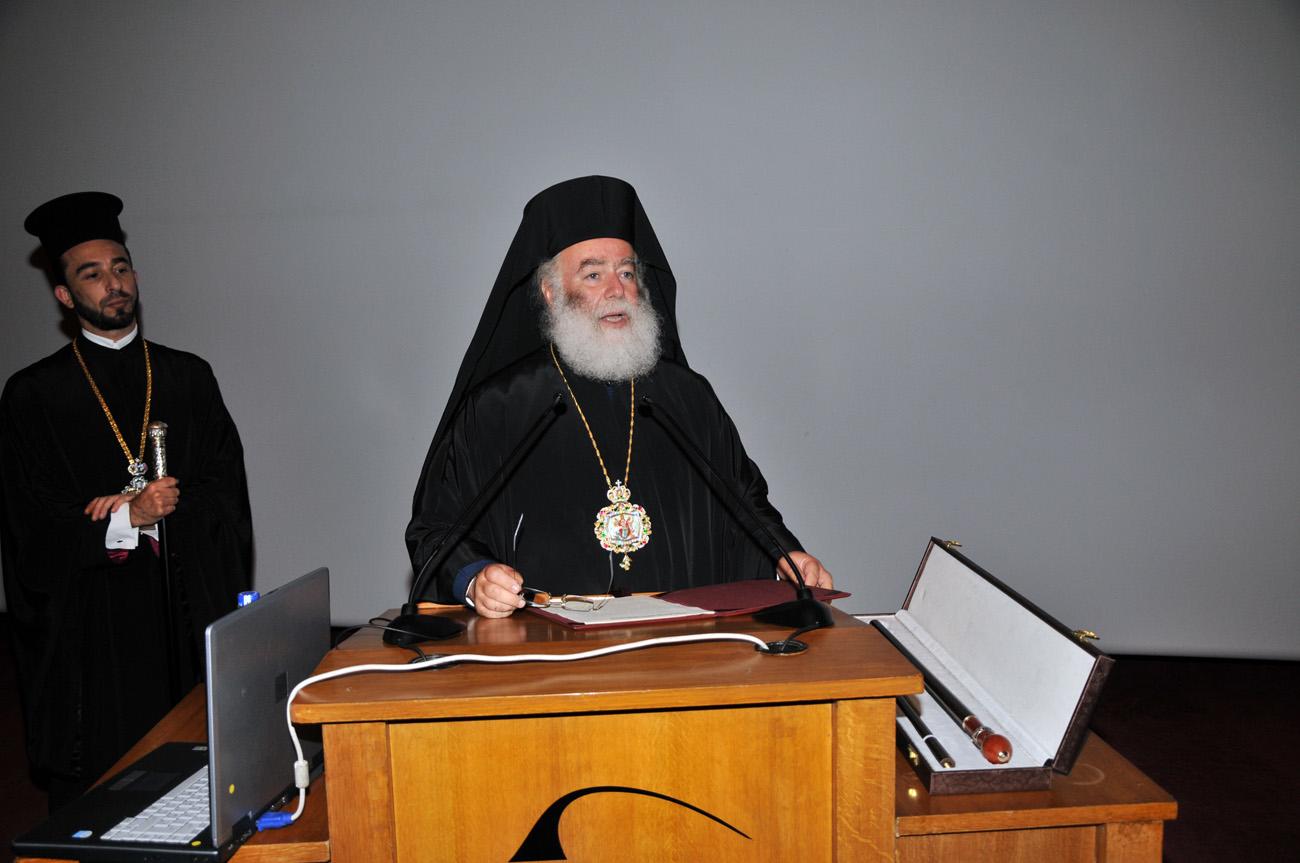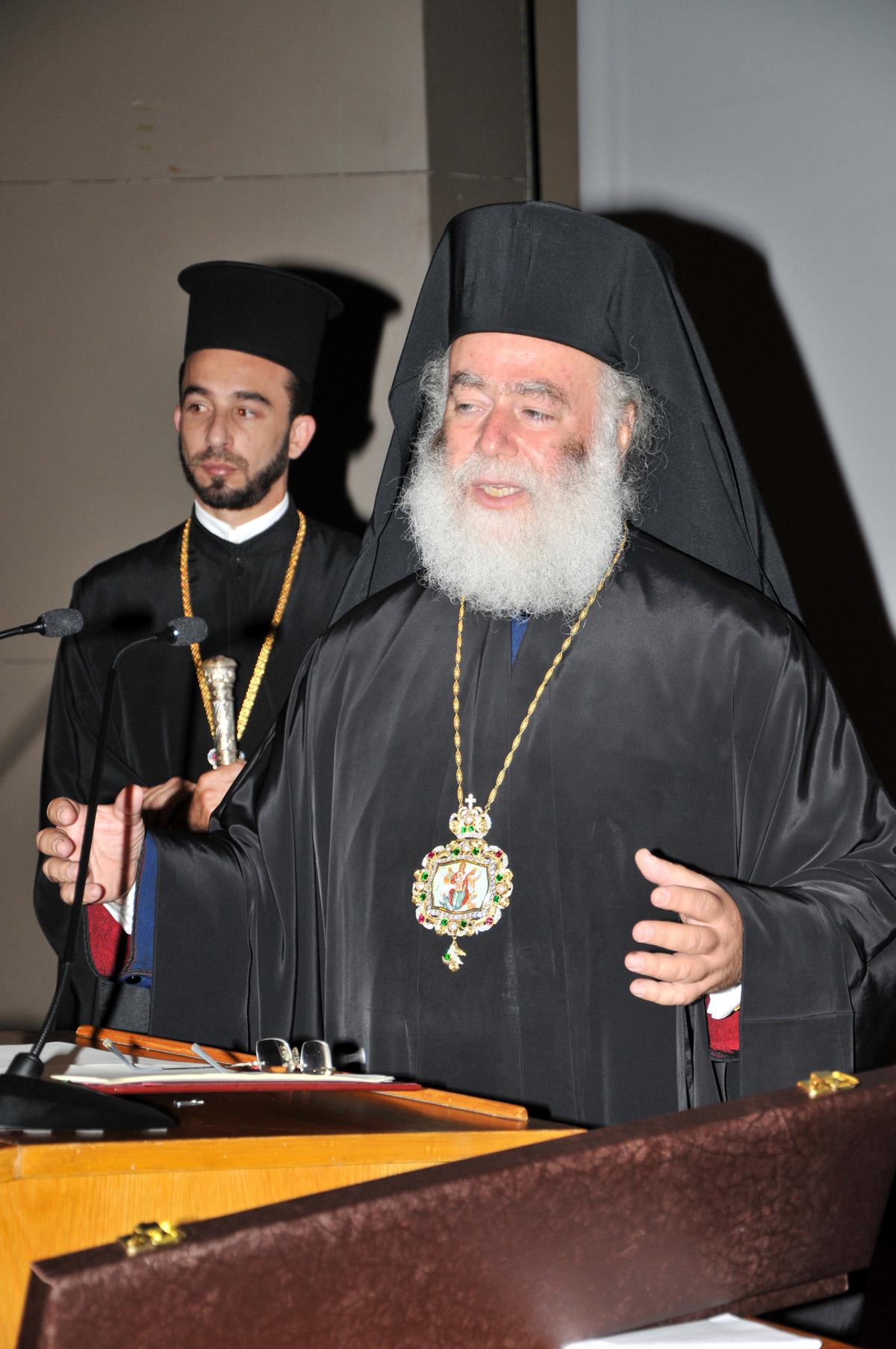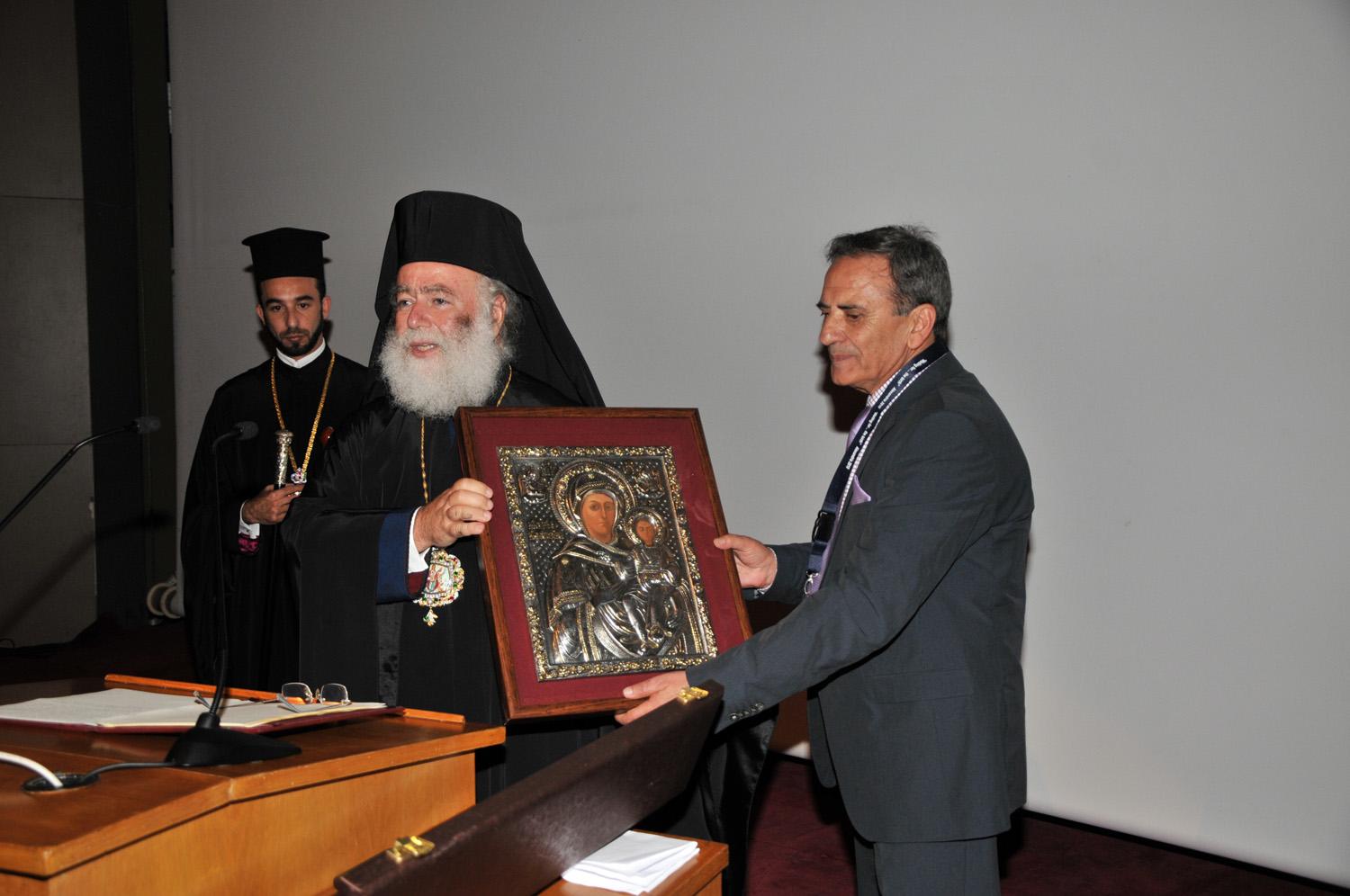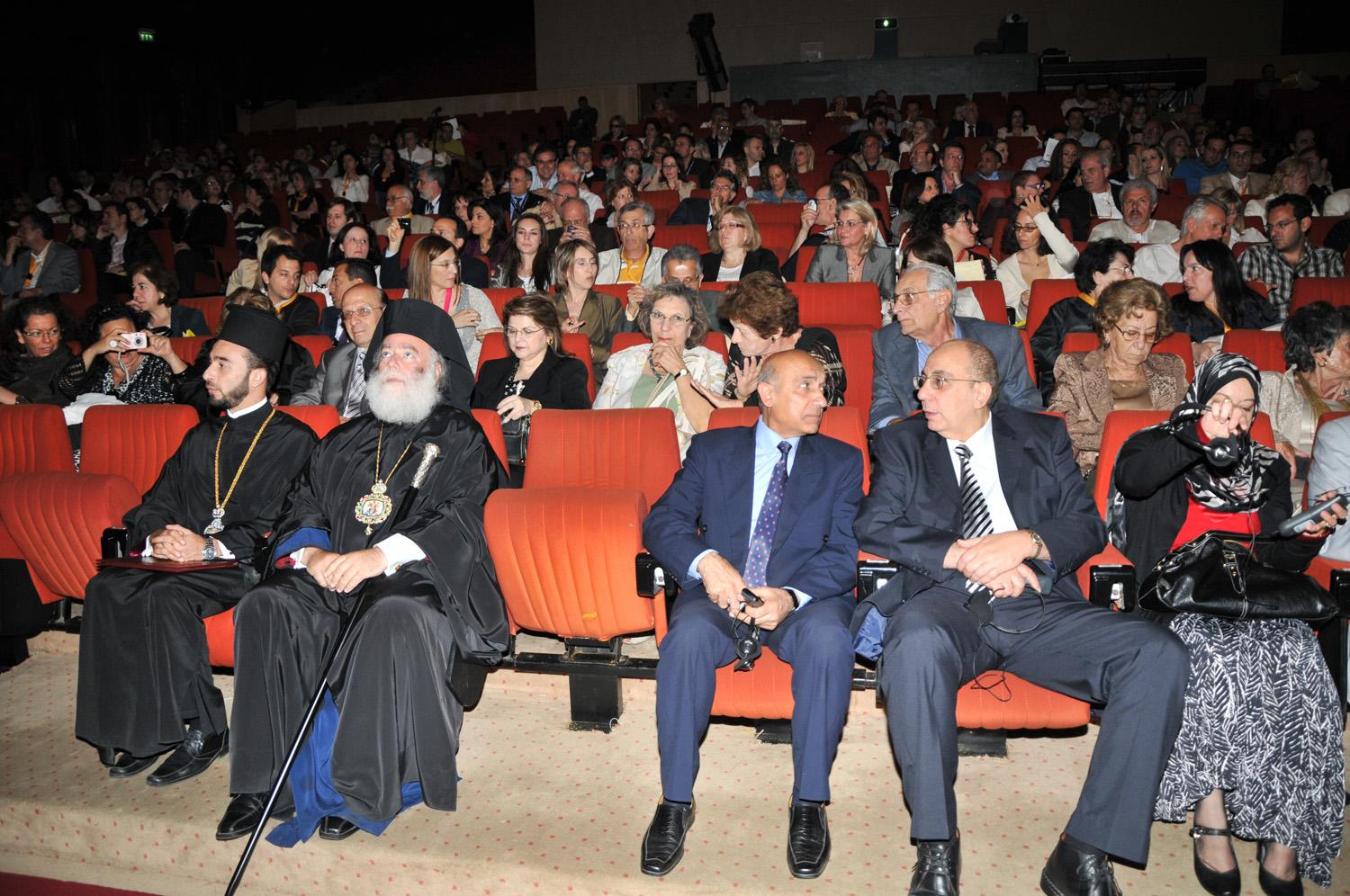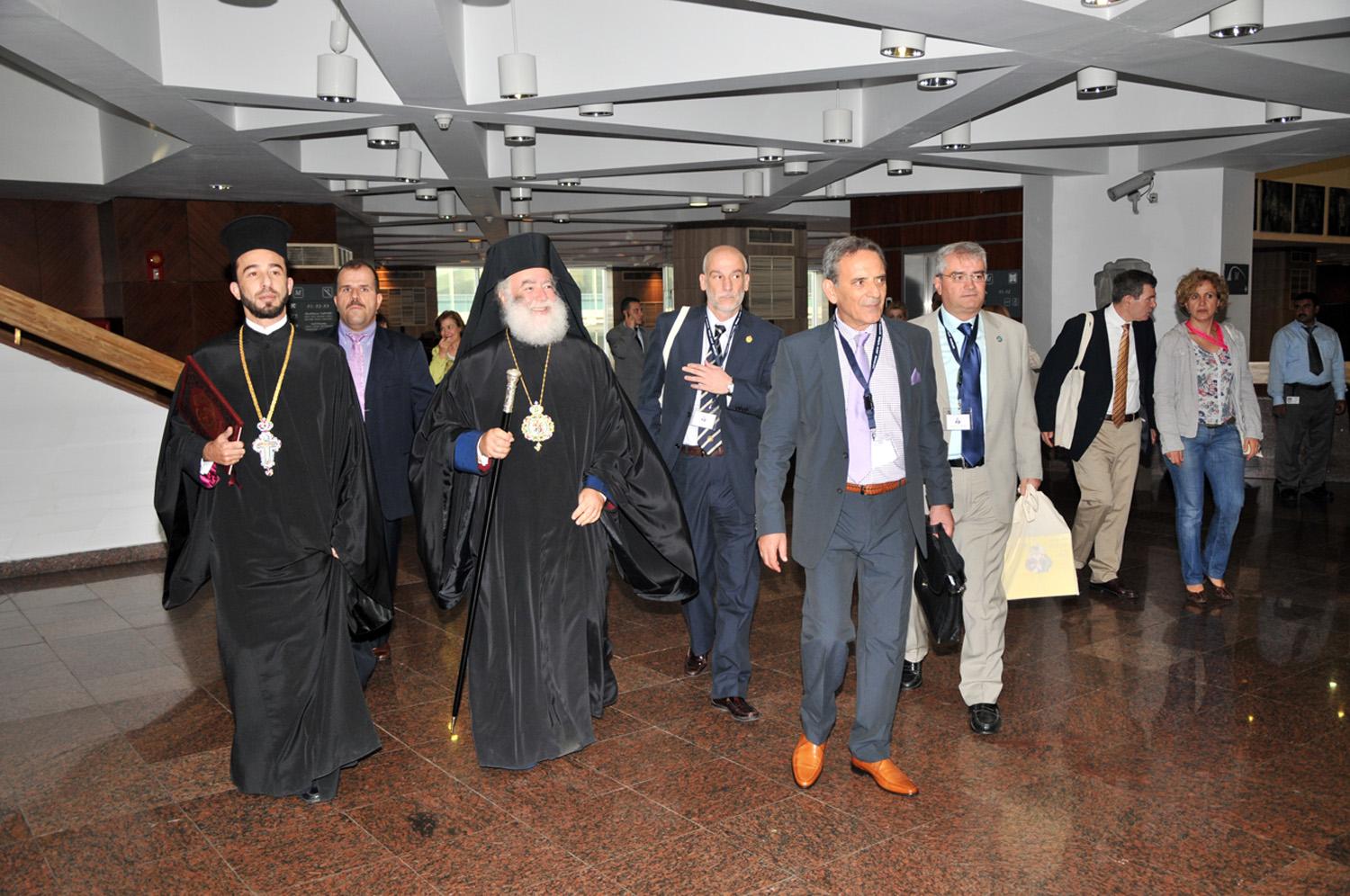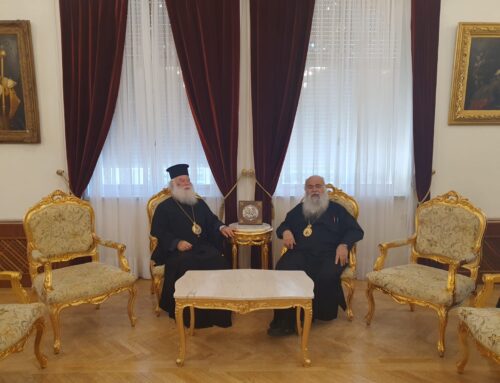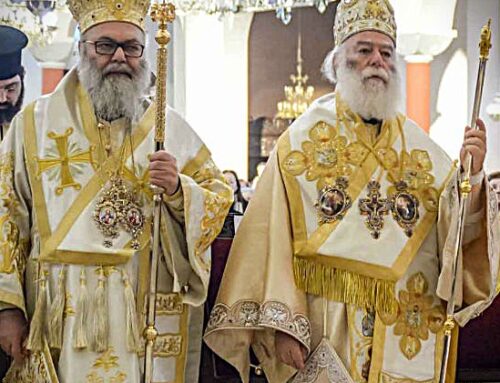On 21st may 2010, in the Alexandrian Library, the opening ceremony of the deliberations of the 10th Dermatological Conference on the subject “Awaiting Childbirth” took place with particular formality. The conference which is under the auspices of His Beatitude Theodoros II, Pope and Patriarch of Alexandria and All Africa was organised by the 3rd Dermatological Clinic of the “A Syggrou” Hospital and the University Dermatological Clinic of Alexandria.
Declaring the beginning of the deliberations His Beatitude said:
It is an extraordinary honor and an exceptional privilege both for me as well as for the Holiest Church of the Apostle and Evangelist Mark that I was entrusted with the honorary presidency of your scientific congress. I am sure that the choice of Alexander’s city, and in particular of her famous Library, to host your congress is directly related with the historical memories of Hellenistic Alexandria. At that time medical science made considerable headway for the benefit of all humankind, combining in an excellent way the Greek exploring mentality with the long Egyptian tradition in preserving the human body.
Nevertheless if, as Lawrence Durrell has written, Alexandria looks like “some great crystal liner anchored to the horn of Africa”, then we, who enjoy the comforts of the deck, must not forget the daily struggle for survival of those people stowed in the hold of the boat of life.
“Waiting for … the birth” is the title of your congress. I do have neither your scientific genius nor your specialized knowledge, yet I can offer you the testimony of my long missionary service. Travelling across the Black Continent, I often face the dream of birth becoming nightmare and the miracle of the newly born human creature being transformed into weeping over its so untimely loss. It breaks my heart to see newborn infants to succumb to tetanus, babies to die of measles, diarrheic dehydration, respiratory infections, and malaria.
But even if the newborns outlive a delivery process that lacks proper obstetrical care, the children of Africa have to fight under desperate conditions with utter poverty, malnutrition, avitaminosis, armed conflicts, and social instability. In Sierra Leone, in Niger, in Angola, in Liberia, in Congo, one in four children dies before the age of five. During my missionary faring I come in contact with children blind due to deficiency in vitamin A, with children mentally retarded due to deficiency in iodine, with children that face the specter of death due to deficiency in iron.
The access to safe water and the existence of hygiene and sanitation facilities, which have been measured that they reduce child deaths by half, are just a dream for millions of Africans. In Africa, just a quarter of rural communities have access to safe water, while, under normal conditions, less than 20% of the Ethiopian population has access to drinking water. In Kenya, people must do many kilometers in order to find water and women must dig down many meters in dry rivers so as to obtain some drinking water.
Nonetheless the holy gift of a new life’s arrival in the world is jeopardized not only by the tragic prospect of child mortality but also of maternal mortality. And, dear participants, a world with children without mothers means world without love. A woman in sub-Saharan Africa has one chance to sixteen to die due to complications during pregnancy or childbirth, compared with one to four thousands in a developed country. It is no coincidence that this statistical indicator differentiates more than any other health indicator the poor from the rich countries. Thus many babies are tragically left orphans and these children are ten times more likely to die within two years after the death of their mother.
Coming head-on with this situation, our missionary groups realize the aggravating role that play both the absence of education among the girls as well as their obedience to often dead-end social conventions. The average childbirths per woman in Africa being six, a lot of pregnancies are early and with increased danger of mortal implications, since many girls get married well before the age of eighteen. Numerous girls cannot recognize the signs of complications during pregnancy and they ignore the proper intervals of time between successive births. Moreover the anachronistic practise of feminine circumcision influences negatively the outcome of the pregnancy, as it causes infections and psychic traumas, injurious for both the pregnant women and the babies.
We should not also forget that HIV is one of the main causes of maternal mortality in sub-Saharan Africa. Roughly ten millions children have lost one or even both their parents because of HIV. Botswana, Zimbabwe and Swaziland present virus spread rates that exceed 30% annually.
And it is really a marvel that in our era, marked by the technological and medical miracles, the survival of nurslings, infants, children and their mothers is such an inessential matter in so many regions of Africa, particularly for the poor and marginalized populations.
The Patriarchate of Alexandria, which the Divine Providence set me to lead, does not remain inert in face of all these almost insurmountable humanitarian problems that deplore the Black Continent, but daily labours in order to mitigate the human suffering. Our missionaries, developing a network of humanitarian help, bring into effect Christian love, as it was taught and incarnated by Saint Mark two millennia ago.
They sink wells, as the access to clean potable water can minimize the levels of diarrheic dehydration. They supply vaccines against measles and mosquito nets against malaria to local communities. They provide children with antistatic medicines and supplements of vitamin A in order to enforce the immunity of their organisms.
They ensure the financing of food programmes to improve the nutritional status of pregnant women and to prevent related problems. They inform women about the necessity of pre-genital and after-genital medical examination to avert the risk of puerperal mortality. They promote exclusive breastfeeding for the first six months of life, a practice that protects children from diarrhoea caused by dirty water.
They build and operate schools, aware of the fact that educated mothers are the keystone of the survival, development and well-being of their families and children. Moreover they are aware of the fact that education constitutes an influential factor that favors the abolition of any discrimination against women and the strengthening of their legal protection.
They collaborate with national health institutions as well as with international non-governmental organizations, so that access to medical care, provided by specially trained personnel, during pregnancy, delivery and the first month after birth, to render safe motherhood. They advocate policy-making that secures the prioritization of obstetrics care within the national health planning.
This is precisely the challenge of promoting, developing, coordinating and effectively organizing our missionary activity that constantly occupies my mind, inspires my activity and stimulates my hopes and my dreams for the continent I serve. My missionary experience in various African countries allows me to be conscious of the fact that hope for a better future cannot exist without respecting the holy gift of life, without protecting the right to safe maternity.
In conclusion, I seize the opportunity to thank and praise in your face all those doctors that all these years have altruistically and earnestly stood by our side and offered valuable services to our missionary groups, saving human lives and alleviating human suffering.
With these fatherly thoughts and agonies I wish every success to your congress.
Director of the 3rd Dermatological Clinic of the “A Syggrou” Hospital, Mr. Athanasios Petrides, having thanked His Beatitude for the honour of his presence, gave him a valuable pastoral staff, and His Beatitude in return offered an Icon of the Mother of God.
On the night of the same day, the Venerable Primate of the Patriarchal Throne of St Mark attended an official dinner which was hosted by the conference in his honour.




